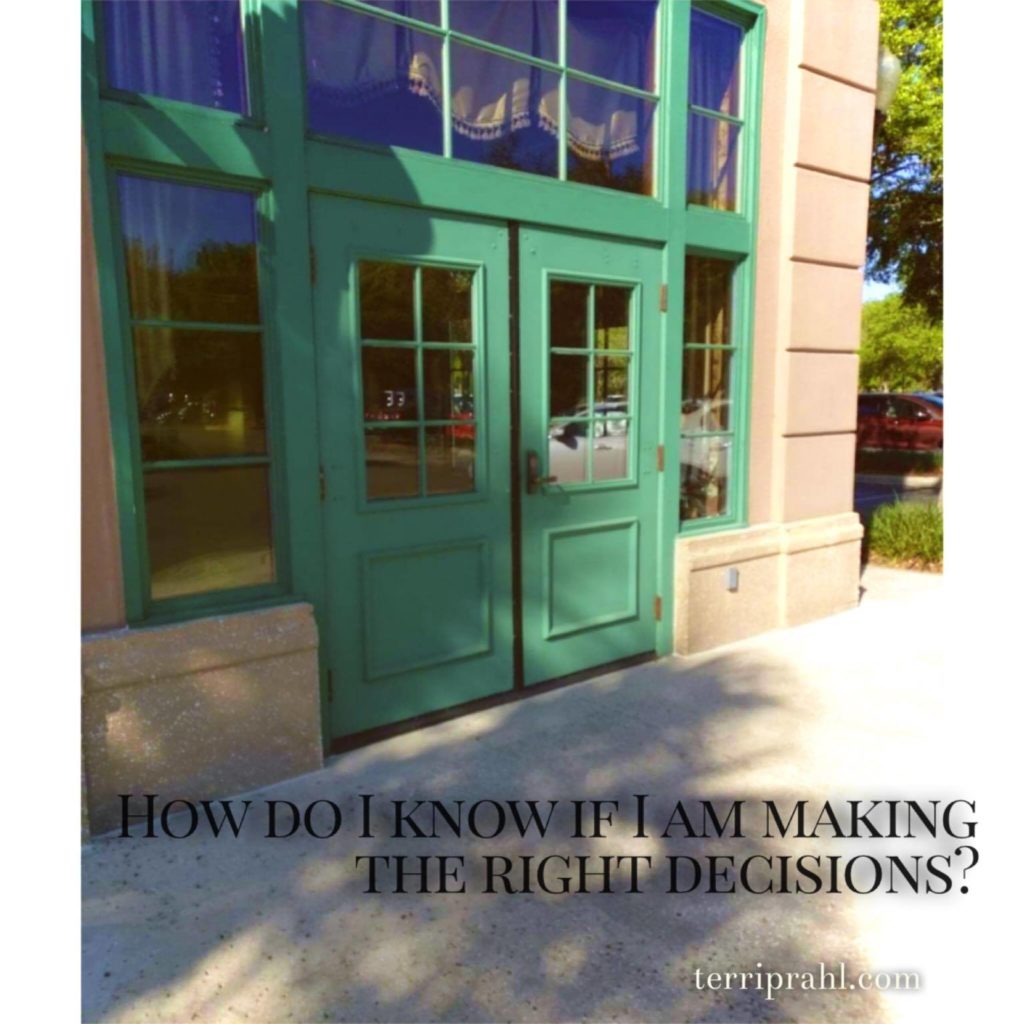The Tension in Decision Making: Learning the Art of Discernment

Some of our greatest fears arise from the tension of decision making. We are afraid of making the wrong decisions and regretting the unforeseen outcomes. If only there was one magic door to open in every situation, wouldn’t our lives be less stressful? If we could just gather enough information, we could be confident in the right decision. If we could all do the same thing and use the same door, we could feel safe in the company of numbers. But realistically, life is so much more complicated and nuanced than this.
The tension exists because God only allows us to see in part (I Cor. 13:12). If we knew the whole story, saw every future event, and did not need to seek Him for wisdom, we would be our own gods. We need Him, and He desires to lead us. This allows us to view the tension of decision making not from a stressful place if we are wise, but from a place of seeking to discern His will and draw close enough to hear Him speak to us. We can be at rest in our decisions when we let His Spirit guide us.
Through this worldwide pandemic, we have seen that there is never a shortage of decisions to be made. We have also seen the results of too much information, polarizing ways to view this information, and the daily decisions needed to navigate this virus. Everyone is trying to decide what information is accurate and what they believe should be done with that information. But how do we, as believers, find peace in decision making? Is there only one right way?

A quick scroll through social media and news comments right now reveals the dilemma many parents are facing about schooling options during Covid. Should they send their kids to school, sign up for online schooling, or try homeschooling? I hear people asking how they can make the right decision. Everyone wants to do it right, even when they are not sure what right is. There are pros and cons to all the unchartered waters they wade through. What if they choose the wrong one? What if they fail their children? It is a big burden to carry on our own.
At the Heart of the Matter
It is hard to decide on solutions when all these questions are rooted in fear. If we are honest, some come from sheer frustration that life is not as easy as we want it to be. There is fear of missing out. Many fear for their sanity at having kids home with them. Many have clung to the systems provided for them to meet the needs of our family and now these constants have been pulled out from under them. This lack of control is the culprit for much of the anxiety, fear, and frustration that is seen in our homes, communities, and world at this moment. If there is no perfect answer, how can we, as believers, choose a good one?
Let me suggest that while we long for an easy button, God desires to give us discernment. He allows us agency and freedom in the world and is more concerned about the why and heart motive behind a decision than the actual choice being made (unless it clearly contradicts God’s Word. We are not talking about that scenario. We are talking about the gray areas of life where we have freedom to make choices.) Only those who abide with Christ will experience this quiet confidence and peace of discernment over their lives.
My Personal Lesson in Discernment:
Years ago, my husband and I went through quite a struggle to decide to homeschool our two children. Although it is more common today, homeschooling is still seen by many as an assault on a broader system deemed best by the larger community. It was considered abnormal in many ways, and we ourselves had our doubts. We feared our choices would negatively impact our kids. We feared they would be ostracized by peers, incorrectly judged by society, and later hate us for ruining their childhood and educational aspirations. That is heavy stuff. While our choice did bring judgement from many, feelings of inadequacy in us as teachers at times, and so much hard work, it was also a joy filled, unique to us way of life. Our vision for our family just did not fit with the daily grind of traditional school. Without trying, we never would have experienced many blessings from God and opportunities to walk in true faith and trust.
How did we sift through the information to discern our good choice?
First, here are some things that we decided could not/would not influence such a big decision for our family:
- Worrying about what other people were doing on behalf of their families. We had to shut out the opinions of the world and ask God to help us make the best choice for us at the time. Comparing ourselves is unwise. Our kids had unique needs. As parents, we had certain giftings, financial considerations, and temperaments. What others chose to do was irrelevant. We alone will answer for how we raised our kids.
- Looking too far ahead and letting what-ifs cause fear in our present. Faith is trusting God. It is believing that He can accomplish His will in your life and your family member’s lives without your perfect choices. He lights our way and can get us where He wants us to be.
- Buying into the world’s ideas about success and education. As Christians, we had conflict with both what the world thinks is a “good” education and what other believers thought was a “good” Christian. Different opinions on what it means to be in the world and not of it, the role of families in education, the purpose of education, and the responsibility to be good members of the community all overwhelmed me in the decision making process. But I knew one thing. My heart was to disciple my kids to walk in the ways of God. To love Him and have time to learn all subjects created by God with a gospel lens. And to spend time lovingly leading them to the kingdom of God. It was also to have time to minister together in our community without all the demands the traditional route requires. As I brought these thoughts to God, I felt peace as He said to me that these were God honoring things. They were good things. I could step out in faith in this decision knowing that my “why’s” were capable of sustaining through the “what-ifs”.
*These same thought patterns can be applied to your unique decision. What questions are plaguing you? Are you seeking to please God in your decisions? Are they good plans that can sustain the “what-ifs” or are your motives impure or contrary to God’s truth?*
As a next step, here are some biblical truths that helped me move from anxiety to peace in decision making:
- If you ask for wisdom, God gives it. James 1:5 says, “If any of you lacks wisdom, let him ask God, who gives generously to all without reproach, and it will be given him.”
If you have not stopped to ask God and seek His guidance, this is your first step in finding peace in your decision.
- If you pray specific, persistent prayers, God will hear and meet our needs. Not always in the way we asked for, but often in ways we could never dare to dream ourselves.
“O LORD, I cry out to you. I will keep on pleading day by day” (Psalm 88:13). “Trust in the LORD with all your heart; do not depend on your own understanding. Seek His will in all you do, and He will direct your paths” (Proverbs 3:5-6).
- Outside of moral commands, life is full of good/good decisions. There are not always clear good/bad, right/wrong moves to make. Homeschooling was not the only right decision we could have chosen. But it was a good one. Our desire to be intentional about their faith and education with freedom was a good why.
“In nothing be anxious; but in everything by prayer and supplication with thanksgiving let your requests be made known unto God. And the peace of God, which passes all understanding, shall guard your hearts and your thoughts in Christ Jesus.
“Finally, brethren, whatsoever things are true, whatsoever things are honorable, whatsoever things are just, whatsoever things are pure, whatsoever things are lovely, whatsoever things are of good report; if there be any virtue, and if there be any praise, think on these things. The things which ye both learned and received and heard and saw in me, these things do: and the God of peace shall be with you.” Philippians 4:6-9
Think on your choices. Which ones are honorable, just, pure, lovely, and of good report? Do they lead to peace? Do they align with the character of Christ?
- God wants us to seek Him. He grows us through the tension of decision making. We only know in part now. We need Him. Studying Scripture builds discernment. Learning to abide and listen to the Spirit takes practice and a daily denial of self.
The heart of the discerning acquires knowledge, for the ears of the wise seek it out.” Proverbs 18:15
- Do it with all your heart unto Him, and He will honor it. I cannot begin to list all the ways God honored our family, answered our prayers, provided our needs, and blessed us more than we deserved. The why of what we do matters to God.
“And whatever you do, in word or deed, do it all in the name of the Lord Jesus, giving thanks to God the Father through Him.” Colossians 3:17
- Give thanks. It is a fast pass to peace in our hearts and minds. Give thanks for children, educational options, individual freedoms, seasons of life, and ways to protect ourselves during this virus! Praising God leads to the greatest peace.
“Don’t worry about anything; instead, pray about everything. Tell God what you need and thank Him for all He has done. If you do this, you will experience God’s peace, which is far more wonderful than the human mind can understand. His peace will guard your hearts and minds as you live in Christ Jesus” (Philippians 4:6-7).
- Do not be afraid to reassess and keep praying. Pray according to His will not yours. If you need to change course, God will show you which path to take.
“Seek his will in all you do,
and he will show you which path to take.”
Proverbs 3:6 NLT
What one step can you take today to find peace in whatever choice you are wrestling through today? Wrestling builds discernment as you seek to understand His wisdom.